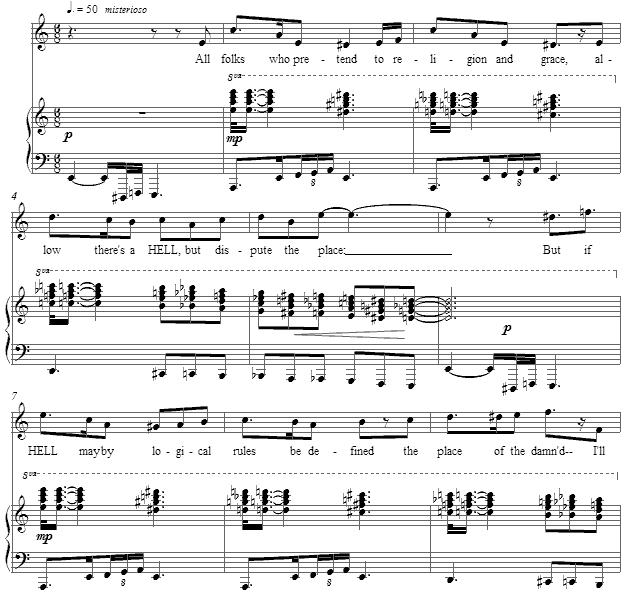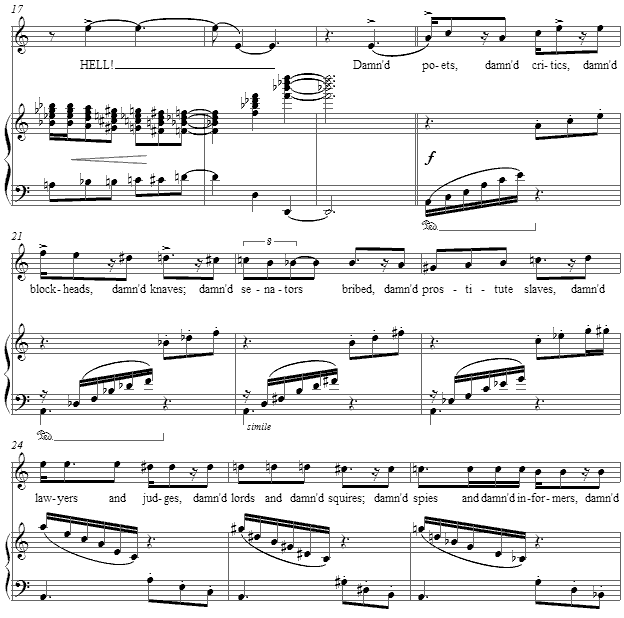Music and Texts of GARY BACHLUND
Vocal Music | Piano | Organ | Chamber Music | Orchestral | Articles and Commentary | Poems and Stories | Miscellany | FAQs
The Place of the Damned - (2006)
Jonathan Swift
for medium voice and piano
All folks who pretend to religion and grace,
Allow there's a HELL, but dispute of the place:
But if HELL may by logical rules be defined
The place of the damn'd--I'll tell you my mind.
Wherever the damn'd do chiefly abound,
Most certainly there is HELL to be found:
Damn'd poets, damn'd critics, damn'd blockheads, damn'd knaves;
Damn'd senators bribed, damn'd prostitute slaves;
Damn'd lawyers and judges, damn'd lords and damn'd squires;
Damn'd spies and informers, damn'd friends and damn'd liars;
Damn'd villains, corrupted in every station;
Damn'd time-serving priests all over the nation;
And into the bargain I'll readily give you
Damn'd ignorant prelates, and councillors privy.
Then let us no longer by parsons be flamm'd,
For we know by these marks the place of the damn'd:
And HELL to be sure is at Paris or Rome.
How happy for us that it is not at home!
Jonathan Swift
Jonathan Swift (1667-1745) was born in Dublin, Ireland, 1667, second child and only son of Jonathan Swift and Abigaile Swift. His father, Jonathan Senior, died before his son was born, san therefore his education was arranged by relatives. Jonathan graduated from Trinity College, Dublin, in 1686. In the aftermath of the 1689 Jacobite rebellion in Ireland, Swift found shelter in England. He secured a position as secretary to Sir William Temple, a prominent politician. In this time, he earned his M.A. at Oxford, was ordained into the Episcopalian Church of Ireland and was charged with the tutorship of Temple's young ward, Esther Johnson, a.k.a. "Stella." When not tutoring, he did much writing that survives shows signs of the great satirist he was to be. After Temple died in 1699, Swift moved back to Ireland, working at various posts in the Church. In 1704, two satirical pieces, Tale of the Tub and Battle of the Books, earned him some renown and some enemies. Returning to England intermittently, he became intimate with the Augustan wits and literary men of the day -- Addison, Steele, Pope and Congreve. Somewhere around 1716, some biographers say he married Stella Johnson, but there's no proof. Though they lived near each other for most of their lives, they were always very properly chaperoned and may very well have never been alone together. With the death of Queen Anne in 1714, the Tories fell from favor and Swift returned to Ireland. He would serve as Dean of St. Patrick's Cathedral in Dublin for the rest of his life.
Gulliver's Travels was published in 1726, Jonathan's first big dive into prose. Though it's been pretty solidly labeled a children's book, it's also a great satire of the times that is pretty much beyond most children. It shows Jonathan's desire to encourage people to read deeper and not take things for granted: readers who paid attention could match all of Gulliver's tall tales with current events and long-term societal problems. Using his sharp wit and tongue, he penned documents that mocked society, religion, human nature, England, politics, and nearly every other facet of daily life. In 1729, Jonathan wrote A Modest Proposal, supposedly written by an intelligent and objective "political arithmetician" who had carefully studied Ireland before making his proposal, calmly suggesting one solution for both the problem of overpopulation and the growing numbers of undernourished people: breed those children who would otherwise go hungry or be mistreated in order to feed the general public.
After the death of his beloved Stella, Swift began to drop off and gradually grew mentally unstable in the years before his death in 1745, aged 78, and was buried in St Patrick's cathedral. Having served his role as an Irish patriot and Tory critic of Whig policies, Swift is duly celebrated in William Butler Yeats's poem "The Seven Sages" and in "Swift's Epitaph," which follows:
Swift has sailed into his rest;
Savage indignation there
Cannot lacerate his breast.
Imitate him if you dare,
World-besotted traveller; he
Served human liberty.
Might we all "serve human liberty," I add as a continuing editorial in our times wherein politicians, regulators and the world press' talking heads, pundits and "commentariat" pursue their dream of restraining individual liberty in favor of purveying their own temporary brilliance. As Swift listed quite adequately these "damn'd," I simply refer the reader of my commentary back to his rather concise list, missing only other artists and especially world leaders of assorted types and varied loyalties. In other words, all of us to some degree or another.
Written with a modest tessitura, this setting of Dean Swift's poem is apt for many voices types. The accompaniment figure sinks by half steps as we imagine these "damn'd" being drawn down to their circle of Hell, perhaps of the type imagined by Dante. As with the opening of his poem, this gesture serves as prelude to Swift's list itself.
The list is again accompanied by a chromatic sinking, over a tonic "pedal." The performers are advised to find the apt tempo to allow a clear enunciation of Swift's text, in order that an audience might find themselves somewhere in it, for the irony of the text is that we all are in some form or fashion "damn'd." But especially critics, says I.
The score is available as a free PDF download, though any major commercial performance or recording of the work is prohibited without prior arrangement with the composer. Click on the graphic below for this piano-vocal score.


